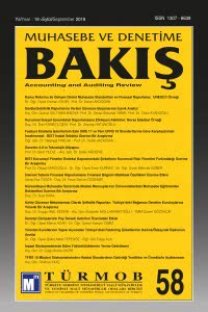Muhasebe politikalarının seçimine etki eden faktörler: Borsa İstanbul (bist)'da bir uygulama
Bu araştırmanın amacı, BİSTde faaliyet gösteren Gıda-İçki ve Dokuma-Giyim-Deri sektöründeki işletmelerin muhasebe politikası seçimini belirleyen önemli etkenlerin belirlenmesidir. Bu amaçla borsada faaliyet gösteren bu firmaların muhasebe politikalarının seçiminde, yöneticilerin tercihlerini etkileyen faktörler belirlenmeye çalışılmıştır. 57 işletmenin 2013 yılına ait 7 farklı muhasebe politikası incelenerek, bu politikaların seçiminde etkili olabilecek değişkenler belirlenmeye çalışılmıştır. 13 ayrı bağımsız değişken esas alınarak, çok değişkenli istatistiksel bir metot olan Kısmi En Küçük Kareler Regresyonu kullanılarak analiz yapılmıştır. Analiz sonucuna göre 13 bağımsız değişken ile kurulan 7 modelden sadece Maddi Duran Varlıkları Değerleme yöntemine ilişkin model anlamlı bulunmuştur. MDV değerleme yöntemi ile ikramiye ödeme planı, kısa vadeli borçların toplam borçlara oranı ve duran varlıkların toplam varlıklara oranı arasında pozitif ilişki, diğer değişkenler arasında negatif ilişki olduğu tespit edilmiştir.
Factors affecting the selection of accounting policies: An application inbist
Aim of this research is determining factors that affect accounting policy choice of food-drink and textileclothing-leather businesses operating BIST. For this purpose, factors affecting managers choices were tried to determine in chosing accounting policy of these businesses operating BIST. By analysing 7 different accounting policies belonging 57 operating businesses in 2013, factors affecting these accounting policies were tried to determine. 13 different variables are taking as a basis, Partial Least Squares Regression (PLSR) which is a multivariate statistical method was used in this analysis. By analysis result, just one model about valuation of fixed asset among 7 models that established 13 independent variables is significant. There is positive relationship between valuation of fixed assets and bonus plan, short-term (current) debt to total debt ratio and fixed assets to total assets ratio. Finally, there is negative relationship between valuation of fixed assets and other variables.
___
Adam, T.R. ve Goyal, V.K. (2008). The Investment Opportunity Set and Its Proxy Variables, Journal of Financial Research, 31 (1), 41-63.Aitken, M. J. ve Loftus, J. A. (2001). Determinants of Accounting Policy Choice In The Australian Property Industry: A Portfolio Approach, Accounting and Finance, 94 (2), 1-20.
Astami, E. W. ve Tower, G. (2006). Accounting-Policy Choice and Firm Characteristics in the Asia Pacific Region: An International Empirical Test of Costly Contracting Theory, The International Journal of Accounting, 41, 1-21.
Aydın, N. (2004). Finansal Yönetim, AÖF Yayınları, Eskişehir.
Bahadır, O. ve Tolga, B. (2013). Accounting Policy Options Under IFRS: Evidence From Turkey, Accounting and Management Information Systems, Vol. 12, No. 3, 388404.
Bulut, E. ve Alın, A. (2009). Kısmi En Küçük Kareler Regresyon Yöntemi Algoritmalarından Nipals ve PLS - Kernel Algoritmalarının Karşılaştırılması ve Bir Uygulama, Dokuz Eylül Üniversitesi İktisadi ve İdari Bilimler Fakültesi Dergisi, Cilt:24, Sayı:2, 127-138.
Bowen, R., Ducharme, L. ve Shores, D. (1995). Stakeholders Implicit Claims and Accounting Method Choice, Journal of Accounting and Economics, 20, 255295.
Cushing, B. E. ve LeClere, M. J. (1992). Evidence on the Determinants of Inventory Accounting Policy Choice, The Accounting Review, Vol.67, No.2, 355-366.
Fields, T. D., Lys, T. Z. ve Vincent, L. (2001). Empirical Research on Accounting Choice, Journal of Accounting and Economics, 31, 255-307.
Gul, F. A. (2001). Free Cash Flow,Debt-Monitoring and Managers, LIFO/FIFO Policy Choices, Journal of Corportae Finance, 7, 475-492.
Hall, S.C. ve Swinney, L.S. (2004) .Accounting Policy Changes and Debt Contracts, Management Research News, 27(7), 34-48.
Healy, P. M. (1985). The Effect of Bonus Schemes on Accounting Decisions, Journal of Accounting and Economics, 7, 85-107.
Holland, K. (1998). Accounting Policy Choice: The Relationship Between Corporate Tax Burdens and Company Size, Journal of Business Finance & Accounting, 25/3.4: 265- 288.
Iatridis, G. ve Joseph, N. L. (2005). A Conceptual Framework of Accounting Policy Choice Under SSAP 20, Managerial Auditing Journal, 20 (7), 763-778.
Inoue, T. ve Thomas, W. B. (1996). The Choice of Accounting Policy In Japan, Journal of International Financial Management and Accounting 7:1, .2-24.
Kallapur, S. ve Trombley, M. A. (2001). The Investment Opportunity Set: Determinants, Consequences and Measurement, Managerial Finance, 27 (3), 3-15.
Levine, C. ve Smith, M. (2011). Critical Accounting Policy Disclosures, Journal of Accounting, Auditing and Finance, 26 (3): 39-76.
Mazay, V., Wilkins, T. ve Zimmer, I. (1993). Determinants of the Choice of Accounting for Investments in Associated Companies, Contemporary Accounting Research, Vol. 10, No. 1 (Fall), 31-59.
Missonier - Piera, F. (2004). Economic Determinants of Multiple Accounting Method Choices in Swiss Context, Journal of International Financial Management and Accounting, 15(2), 118-143.
Morais, A. I. (2008). Actuarial Gains and Losses: the Choice of the Accounting Method, Accounting in Europe, Vol. 5, No. 2, 127 139.
Morais, A. I. (2010). Actuarial Gains and Losser: The Determinants of the Accounting Method, Pacific Accounting Review, Vol. 22, No. 1, 42-56.
Niehaus, G. R. (1989). Ownership Structure and Inventory Method Choice, The Accounting Review, 64 (2), 269-284.
Nobes, C. ve Perramon, J. (2013). Firm Size and National Profiles of IFRS Policy Choice, Australian Accounting Review, No. 66 Vol. 23 Issue 3, 208-215.
Ulusan, H. (2005). Muhasebe Politikası Seçiminin Ekonomik Belirleyicileri Üzerine Ampirik Bir Çalışma, Ankara Üniversitesi SBF Dergisi, 62-2, 167-198.
Ulusan, H. ve Doğan, İ. (2008). Muhasebe Politikası Seçimi: Pozitif Muhasebe Teorisi ve Ekonomik Belirleyiciler - Ampirik Bir Çalışma, H.Ü. İktisadi ve İdari Bilimler Fakültesi Dergisi, Cilt 26, Sayı 1, S. 229-254.
Young, S. (1998). The Determinants of Managerial Accounting Policy Choice: Further Evidence for the UK, Accounting and Business Research, Vol.28, No.2, 131-143.
Watts, R. L. ve Zimmerman, J. L. (1978), Towards a Positive Theory of the Determination of Accounting Standards, The Accounting Review, L III/1: 112-134.
Waweru, N. M., Ntui, P. P. ve Mangena, M. (2011). Determinants of Different Accounting Methods Choice In Tanzaniaa Positive Accounting Theory Approach, Journal Of Accounting In Emerging Economies; Vol. 1 Issue 2, 144-159.
Zinkeviciene, D. ve Rudzioniene, K. (2005). Impact of Companys Leverage on Financial Accounting Method Choice, Engineering Economies, 5(45), 25-30.
www.kap.gov.tr
- ISSN: 1307-6639
- Yayın Aralığı: Yılda 3 Sayı
- Başlangıç: 2000
- Yayıncı: TÜRMOB
